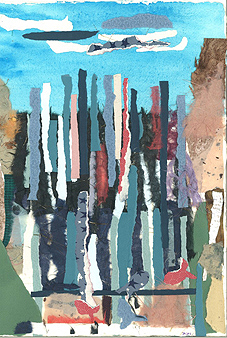|
World Literature and the Postcolonial:
Ngugi’s Globalectics and Glissant’s Poetics Duncan McEachern Yoon Etymologically speaking, globalectics is a neologism of the “global and dialectical.” While an obvious gesture to his own intellectual trajectory, in particular his engagement with materialism, this amalgamation of terms attempts to pluralize the linearity of dialectics. That is to say, if a dialectic is understood as simple movement between two points, then Ngugi’s globalectic seeks to multiply these points and the possible relations they may have between each other. Of integral importance is the flexibility of these relationships. This flexibility is what ensures the possibility of a movement forward. One of the many problems of the power dynamic produced by the colonial system lay in the suturing of one point, the colonizer, as the master of another point, the slave.[1] As historically rooted in the exigency of colonial economic modes of production, the enforced stasis of this relationship produced a hierarchy of knowledges, peoples, and cultures. In short, it produced the European center and the colonized periphery, which still haunts the contemporary moment. If Ngugi’s globalectic is occupied with a reorientation of center and periphery around a multitude of experiences, then Édouard Glissant in his Poetics of Relation (1990) is equally committed to such a diversification: “The poet’s word leads from periphery to periphery, and, yes, it reproduces the track of circular nomadism; that is, it makes every periphery into a center; furthermore, it abolishes the very notion of center and periphery” (Glissant 29). Glissant’s relational poet emphatically rejects the rooted fixture of a center. The poet is rootless and moving, a circular nomad who transforms each space as s/he enters it and in so doing, creates a theory of knowledge that is constantly in a state of flux and reevaluation. A non-exploitative movement forward and through—rather than marginalized or circumventive—is understood as “entanglements of world-wide relation” (Glissant 31). Glissant describes these entanglements as an improvement upon the colonial world-view that predicated itself on the reductive dichotomy of assimilation or annihilation. According to this model, a colonized person’s difference—racial, cultural or linguistic—was met with an implacable and hostile denial. In contrast, Glissant’s entanglement respects the encountered difference in the “other,” thereby “protect[ing] the Diverse” (Glissant 62). It is a way of creating a totality of experience without the trap of totalitarianism. Pages: 1 2 3 4 5 [1] Ngugi’s first chapter in Globalectics provides a detailed analysis of Hegel’s master and slave. |
Essays in this Forum
Break out of the Prison House of Hierarchy!
by Mukoma Wa Ngugi A Globalectical Imagination by Ngugi wa Thiong'o World Literature and the Postcolonial: Ngugi's Globalectics and Glissant's Poetics by Duncan McEachern Yoon “You Are the Prisoner, the Discoverer, the Founder, the Liberator”: Contextualizing Decolonial Paths of Afro-Hispanic Literature in Latin America, Equatorial Guinea and Spain by Elisa Rizo Globalectics Beyond Postcoloniality by Carole Boyce Davies |
